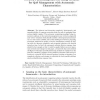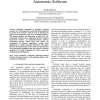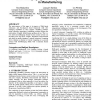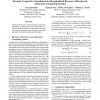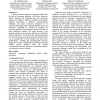129
click to vote
APNOMS
2009
Springer
14 years 11 months ago
2009
Springer
The inherent and increasing complexity, heterogeneity and unpredictability of computer networks make the task of managing these systems highly complex. The autonomic computing para...
109
click to vote
CORR
2004
Springer
15 years 1 months ago
2004
Springer
Autonomic computing has been proposed recently as a way to address the difficult management of applications whose complexity is constantly increasing. Autonomous applications will ...
109
click to vote
JSW
2008
15 years 1 months ago
2008
Autonomic computing is gradually becoming accepted as a viable approach to achieving self-management in systems and networks, with the goal of lessening the impact of the complexit...
139
click to vote
CISIS
2007
IEEE
15 years 2 months ago
2007
IEEE
Problem determination in today's computing environments consumes between 30 and 70% of an organization’s IT resources and represents from one third to one half of their tot...
146
click to vote
GECCO
2008
Springer
15 years 3 months ago
2008
Springer
The main purpose of this paper is to propose a Multi-Agent Autonomic and Bio-Inspired based framework with selfmanaging capabilities to solve complex scheduling problems using coo...
157
click to vote
FUNGAMES
2010
15 years 3 months ago
2010
Autonomic Computing is now showing its value as a solution to the increased complexities of maintaining computer systems and has been applied to many different fields. In this pap...
158
click to vote
IJCAI
2003
2003
Towards Cooperative Negotiation for Decentralized Resource Allocation in Autonomic Computing Systems
15 years 3 months ago
Resource allocation is a key problem in autonomic computing. In this paper we use a data center scenario to motivate the need for decentralization and cooperative negotiation, and...
138
click to vote
EUMAS
2006
15 years 3 months ago
2006
Current IT application domains such as web services and autonomic computing call for highly flexible systems, able to automatically adapt to changing operational environments as w...
130
click to vote
ISCAPDCS
2007
15 years 3 months ago
2007
Current research in autonomic computing suffers from the lack of a common definition of the basic autonomic entities. Defining and developing the basic autonomic entities and maki...
